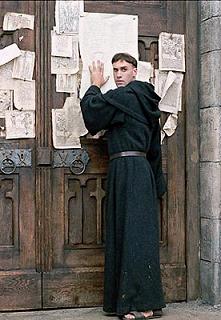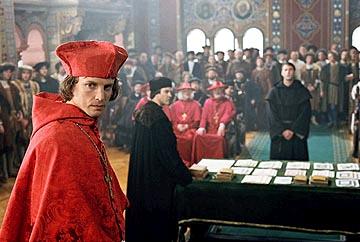

Although Martin Luther is one of the most important figures in Protestant Christianity's history, many people know only the most rudimentary details about his life. He was German, he disagreed with some of the practices of the Catholic Church and nailed his "95 Theses" on a door, then viola! Protestants split off from Catholics. From a historical perspective, there is a lot more to him, and the Lutheran Church funded Luther to give a fuller view of the life of Martin Luther. It does shed light on the historical activities of Luther, but doesn't quite get into the character of Luther. This is because of the casting of Joseph Feinnes. Feinnes (Sinbad: Legend of the Seven Seas, Enemy at the Gates) is a competent actor, but not right for Martin Luther. He broods a little too much, and is a little too moody for the role.
The first half of Luther is good. Director Eric Till (Duct Tape Forever, Bonhoeffer: Agent of Grace) and screenwriters Camille Thomasson (Ave Maria) and Bart Gavigan portray a young Luther increasingly frustrated with some of the actions of the Church. All of this is personified by the character of Johann Tetzel (Alfred Molina, Identity, My Life Without Me). Tetzel is traveling the countryside selling indulgences. Luther sees somebody profiting off the sins of people, giving non-existent promises that man has no right to give. Is this reasonable? Luther tries hard to present a rational case to the Church, only to have them rebuff him. Looking back, Luther's arguments were very reasonable. The Catholic Church today would never do what Tetzel did. He was clearly corrupt, and Luther was right to be outraged. And why can't people read the Bible in their own language? Luther successfully comes across as learned, and more importantly, reasonable.
Till begins to lose the audience once Luther's audience in the film grows. The church wants to get rid of him, and Luther only wants his views heard; he has no desire to split the Church. He goes up against people like Girolamo Aleandro (Jonathan Firth, An Ideal Husband, Six-Pack), portrayed by Till as simplistic and unwilling to listen to any sort of reason. Others, like Katerina von Bora (Claire Cox, Shooting Fish, The Leading Man) who later becomes his wife, are bereft of any personality. The one bright presence in Luther is Sir Peter Ustinov (Stiff Upper Lips, The Will to Resist), who plays a sprightly supporter of Luther's. The bulk of the film falls upon Feinnes, who wrests with his newfound burden. He goes into hiding for his own protection, and his followers become a mad mob.
Till tries to up the drama as the film proceeds, but ends up trying to incorporate too many things at the same time. He wants to portray Luther's romance with von Bora, and the confrontation with the Church that will serve as the emotional climax of the film. Till also wants the viewer to know whom Luther was as a person, to see the man behind the history, and this accounts for the downward spiral of the latter portion of the film. Till ends the film somewhat abruptly. Part of the story is done, but people still want to know how the Protestant church developed.